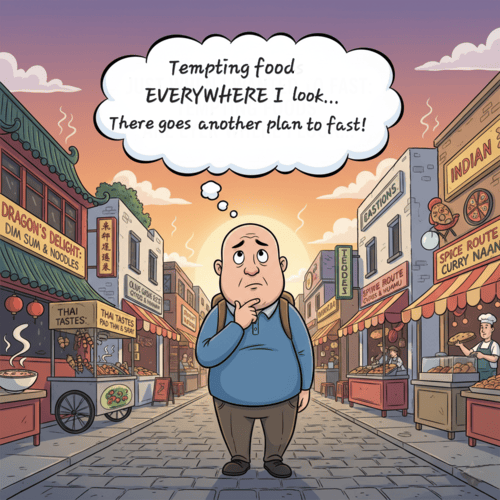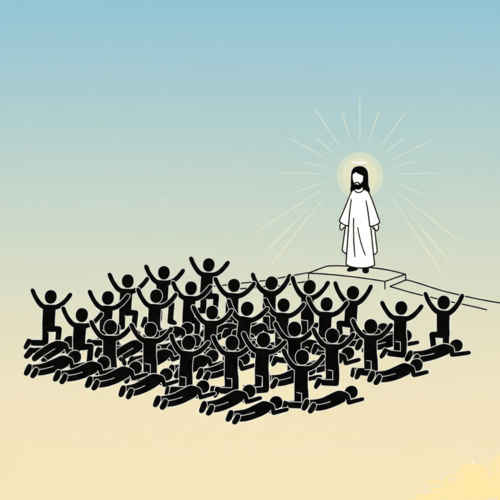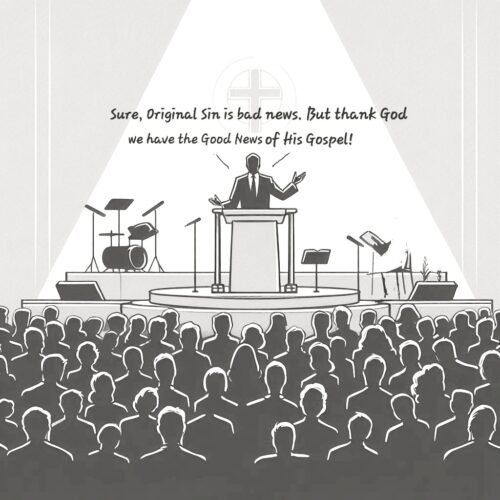Born Guilty: Why Affirm the Difficult Doctrine of Original Sin?
Ever wondered why a newborn baby, seemingly innocent, still needs salvation? Or why every human culture, despite its best efforts, still struggles with moral failure? The doctrine of original sin provides the answer, explaining both our universal moral corruption and our desperate need for Christ.
Original sin isn’t just about Adam and Eve eating forbidden fruit in a garden long ago. It’s about a catastrophic event that fundamentally changed human nature—like a spiritual genetic mutation that has been passed down to every human being. Think of it this way: When Adam sinned, he was acting not as an individual but as humanity’s representative head.
This might sound like bad news—and it is. But understanding original sin is crucial because it helps us grasp why we need a Saviour and the good news of His gospel. As we explore the doctrine together, we’ll discover how it points us to the magnificent hope we have in Christ.
UNDERSTANDING ORIGINAL SIN
When Adam ate the forbidden fruit in the Garden of Eden, that act wasn’t merely a personal transgression—it was a cosmic catastrophe that fundamentally altered the human race’s relationship with God. Scripture tells us, “Therefore, just as sin came into the world through one man, and death through sin, and so death spread to all men because all sinned” (Romans 5:12).
Original sin manifests in two crucial ways:
- Inherited Corruption: Our inherited corruption means we’re born with a nature inclined toward sin. None of us needs to be taught to sin. As David laments, “Behold, I was brought forth in iniquity, and in sin did my mother conceive me” (Psalm 51:5). The corrupted nature isn’t merely learned behaviour—it’s our very essence apart from Christ.
- Imputed Guilt: But beyond corruption, we bear Adam’s imputed guilt (Romans 5:18; 1 Corinthians 15:21). Jonathan Edwards powerfully expresses this truth: “When God made man at first, he made him one with his posterity. The whole human race, by God’s constitution, were as one moral person.” This federal headship means Adam’s act is legally considered ours.
THE BIBLICAL FOUNDATION
Scripture consistently presents humanity as unified in Adam’s fall. Paul’s argument in Romans 5:12-21 is particularly decisive, drawing a parallel between our condemnation in Adam and our potential justification in Christ: “For as by the one man’s disobedience the many were made sinners, so by the one man’s obedience the many will be made righteous” (Romans 5:19).
The covenant framework undergirding this truth appears throughout Scripture. Just as Abraham’s actions affected his descendants and Moses represented Israel before God, Adam stands as humanity’s representative head. The principle of federal representation isn’t a mere theological construct—it’s woven into the fabric of biblical revelation.
ADDRESSING FIVE COMMON OBJECTIONS
The doctrine of original sin has faced numerous objections throughout church history. Here are the main challenges and their biblical refutations:
- “It’s not fair to be guilty of another person’s sin“: This objection stems from modern individualism and misunderstands biblical corporate solidarity. Many argue personal responsibility precludes inherited guilt, and each of us should be judged only for our own actions.
The Bible’s Response: Scripture consistently presents both individual and corporate responsibility as compatible truths. Just as Levi paid tithes in Abraham (Hebrews 7:9-10) and all Israel was guilty of Achan’s sin (Joshua 7), humanity’s solidarity with Adam is a biblical reality. Romans 5:12-19 explicitly teaches that “through one man’s disobedience the many were made sinners.”
- Pelagianism “Human nature is unaffected by the Fall”: Pelagius taught that Adam’s sin affected only himself, that newborns are born in the same state as Adam before the Fall, and that human will is completely free to choose good without divine grace. This view claims each person sins merely by following Adam’s bad example.
The Bible’s Response: Scripture categorically denies this view, teaching we’re “dead in trespasses and sins” (Ephesians 2:1), “brought forth in iniquity” (Psalm 51:5), and “by nature children of wrath” (Ephesians 2:3). Jesus Himself declared “no one can come to me unless the Father draws him” (John 6:44), refuting the notion we’re capable, unassisted, to choose salvation.
- Semi-Pelagianism “Human nature is damaged but not totally corrupt”: This view teaches that while the Fall wounded human nature, it didn’t totally corrupt it. It claims we can take the first steps toward God without grace, and then God responds to our initiative with saving grace.
The Bible’s Response: Scripture teaches “no one seeks for God” (Romans 3:11) and faith itself is God’s gift (Ephesians 2:8-9). Jesus teaches we must be born again even to see the kingdom (John 3:3), and that “apart from me you can do nothing” (John 15:5). Our inability is not partial but total.
- “Children are innocent until they reach an ‘age of accountability”: Many argue young children cannot be guilty of sin until they reach an age where they can consciously choose between right and wrong. This view seeks to protect God’s justice and explain infant salvation.
The Bible’s Response: While Scripture shows God’s special concern for children, it never teaches an “age of accountability.” Instead, it affirms that we are “estranged from the womb” (Psalm 58:3) and that death’s universal reign proves universal guilt (Romans 5:14). Our hope for deceased infants rests not on their innocence but on God’s mercy in Christ.
- “Each soul is created fresh by God—how can it be corrupted?”: This objection argues that if God creates each soul directly, it must be created pure. How can God create something corrupt or guilty?
The Bible’s Response: Scripture teaches that God can create something good which becomes corrupted through federal headship and natural generation. While God is the ultimate author of our being (Psalm 139:13-16), we receive our nature through natural generation “in Adam.” Just as a pure stream becomes polluted by flowing through corrupt soil, our nature is corrupted by our connection to Adam.
THE GOOD NEWS: CHRIST AS THE LAST ADAM
Here’s where the doctrine’s beauty emerges. Just as we’re condemned in Adam, we can be justified in Christ, “the last Adam” (1 Corinthians 15:45). Paul draws this parallel explicitly: “For as in Adam all die, so also in Christ shall all be made alive” (1 Corinthians 15:22).
The imputation of Adam’s guilt finds its glorious counterpart in the imputation of Christ’s righteousness. Through faith, we’re united to a new federal head who perfectly fulfilled God’s covenant demands.
As John Murray wrote, “The parallel between Adam and Christ serves to demonstrate that as the disobedience of Adam is imputed to all whom he represented, so the obedience of Christ is imputed to all whom He represented.”
PRACTICAL IMPLICATIONS
Understanding the doctrine of original sin produces several vital effects in the believer’s life:
- It deepens our appreciation of salvation’s necessity. We’re not merely imperfect people needing improvement—we’re dead in trespasses and sins (Ephesians 2:1), requiring nothing less than supernatural resurrection.
- It magnifies God’s grace. The depth of our fall highlights the heights of divine mercy. “Where sin increased, grace abounded all the more” (Romans 5:20).
- It fosters genuine humility. Knowing we’re born guilty and corrupt leaves no room for spiritual pride. Every good in us is purely God’s grace.
CONCLUSION: THE DOCTRINE OF ORIGINAL SIN
Far from being a mere theological abstraction, the doctrine of original sin explains our universal experience of moral failure and points us to our only hope—union with Christ. In Him, we find not just the reversal of Adam’s fall but “much more” (Romans 5:17)—an abundance of grace and eternal life.
The question isn’t really whether we’re guilty in Adam—Scripture clearly affirms we are. The real question is whether we’ll remain there or flee to Christ, the last Adam, in whom we find perfect righteousness and life everlasting. As the Puritan Thomas Watson beautifully expressed it: “In the first Adam we died, in the second Adam we live.”
Let us then embrace this humbling truth, not as a cause for despair but as the dark backdrop against which the diamond of God’s grace sparkles all the more brilliantly.
DOCTRINE OF ORIGINAL SIN—RELATED FAQs
If we inherit Adam’s guilt, why don’t we inherit our parents’ guilt for their sins? Adam stood in a unique position as the federal head of all humanity, appointed by God as our covenant representative (Romans 5:12-14). Just as an ambassador’s decisions legally bind their nation, Adam’s action had binding force for all he represented. This special role belongs only to Adam and Christ (1 Corinthians 15:45-49), not to individual parents.
How can God hold me responsible for a choice I never consciously made? We actually make sinful choices every day that validate our solidarity with Adam’s decision. However, the deeper reality is we were genuinely present “in Adam” when he sinned, just as Levi was “in Abraham’s loins” when Abraham paid tithes to Melchizedek (Hebrews 7:9-10). Our union with Adam is both federal and natural, making his act truly ours.
Doesn’t this doctrine make God the author of sin? God created Adam good and gave him both the ability to obey and genuine freedom to choose. The entrance of sin came through Adam’s free choice, not God’s decree, though God sovereignly permitted it for His greater purposes. Sin’s origin lies in the creature’s choice, while its permission serves God’s perfect plan for displaying His full glory in redemption (Romans 9:22-23).
If we’re born sinful, how can God command us to be holy? God’s commands reflect His righteous standard, not our ability to meet them. The law serves as a mirror to show us our sin (Romans 3:20) and drive us to Christ (Galatians 3:24). Our inability to keep God’s law doesn’t nullify our responsibility but reveals our desperate need for grace.
How could one sin corrupt all of human nature? Adam’s sin wasn’t merely eating forbidden fruit but was a comprehensive rejection of God’s authority, a breach of perfect fellowship that corrupted man’s entire relationship with God. Like a drop of poison in a water supply affects all who drink from it, Adam’s sin poisoned the very fountain of human nature. The entirety of human nature was present in Adam when he fell, and thus the corruption was total (Romans 5:18-19).
If we’re totally depraved, how do unbelievers still do good things? Total depravity doesn’t mean every person is as evil as they could be, but that sin has affected every part of human nature. Through God’s common grace, unbelievers can still perform acts that are externally good, but without faith it’s impossible to please God (Hebrews 11:6). Even the “good” acts of unbelievers fall short of God’s perfect standard because they don’t proceed from faith and aren’t done for His glory.
How does original sin relate to Christ’s human nature? While Christ took on true human nature, He did not inherit original sin because He was conceived by the Holy Spirit, not through natural generation from Adam (Luke 1:35). Christ assumed our nature but not our guilt, making Him the perfect “last Adam” who could represent us without being tainted by sin Himself (2 Corinthians 5:21; Hebrews 4:15).
Editor's Pick

Faithful to the Pattern: Why Paul Reserves Ordination for Men
Few topics in contemporary Christianity generate more tension than women’s ordination. This question touches real lives, genuine callings, and deeply [...]

‘Flee Sexual Sin’: Why Does Paul Single This Sin Out?
When the apostle Paul writes to the Corinthian church, he doesn’t tell them to simply avoid sexual immorality or resist [...]

Does Denying God’s Sovereignty Mean Denying the Gospel?
RC Sproul once warned denying God’s sovereignty “eviscerates” grace—a strong word meaning to gut or disembowel something, leaving only an [...]

Why Christians Fast: The Biblical Discipline’s Very Real Rewards
Why would Christians, who rejoice in the good gifts of food and fellowship, deliberately choose to go without? Isn’t fasting [...]

The Christian Sabbath: Why Did Sunday Replace Saturday?
Consider this: God-fearing Jews who’d faithfully observed Saturday Sabbath for over a thousand years suddenly began gathering for worship on [...]

Did the Early Christians Worship Jesus? The Biblical Evidence
It was a startling transformation: Jewish fishermen who'd spent three years following this itinerant carpenter from Nazareth now begin to [...]

If Jesus is Messiah, Why Aren’t ALL Messianic Prophecies Fulfilled?
If Jesus is truly the Messiah, why hasn't world peace arrived? Why do Jews still face persecution? Why isn't the [...]

When Courage Fails: Will I Be Forgiven If I Deny Christ in Persecution?
The rooster crowed, and Peter remembered. In that devastating moment, the apostle realised he’d just done the unthinkable—three times he’d [...]

What Makes a Godly Dad? 5 Biblical Principles Fathers Need
Modern culture sends fathers mixed messages. Be strong but sensitive. Be involved but not overbearing. Lead but don’t dominate. With [...]

What Makes a Godly Mom? A Scripture-Backed Guide
In our culture’s confusion about gender roles and parenting, the timeless question remains: what makes a godly mother? While secular [...]
SUPPORT US:
Feel the Holy Spirit's gentle nudge to partner with us?
Donate Online:
Account Name: TRUTHS TO DIE FOR FOUNDATION
Account Number: 10243565459
Bank IFSC: IDFB0043391
Bank Name: IDFC FIRST BANK






